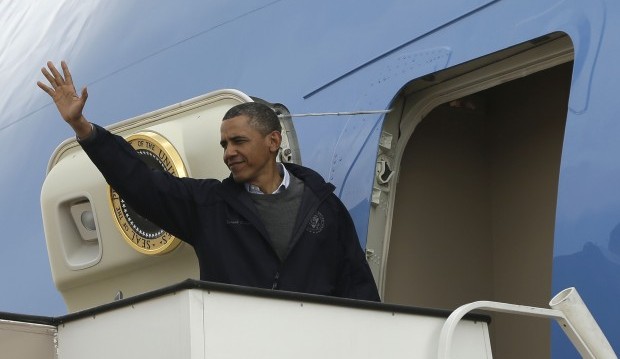
U.S. President Barack Obama waves from Air Force One as he leaves Jordan at the Queen Alia International Airport in Amman Saturday, March 23, 2013. (AP Photo/Pablo Martinez Monsivais)
Ramallah/Tel Aviv, Asharq Al-Awsat—US President Barack Obama today wound up his four-day tour of the Middle East with a visit to Petra, after completing his final diplomatic engagements on Friday. During talks held over the past week in Israel, the Palestinian territories, and Jordan, the US President has touched on the Middle East peace process, rapprochement between Turkey and Israel, and the ongoing crisis in Syria.
In a speech in Jerusalem on Thursday, Obama insisted that “peace is possible” between the Israelis and the Palestinians, and appealed for both sides to return to negotiations. With regards to the issue of Israel settlement activity, Obama referred to it as “counterproductive to the cause of peace,” but did not repeat his administration’s earlier demands for construction to be halted entirely.
This revised stance would not have gone unnoticed by the Palestinians, who are demanding an immediate halt to settlement construction as a prerequisite to any further talks with Israel. A Palestinian source speaking to Asharq Al-Awsat revealed that Obama, during his meeting with Mahmoud Abbas in Ramallah on Thursday, asked the Palestinian president not to go to the International Criminal Court (ICC) against Israel for any reason, including the settlement issue. Abbas replied that he would wait another two months before taking any steps—in the hope of persuading Israel to freeze settlement construction and enter into immediate negotiations—but confirmed that he would go to the ICC immediately if Israel began settlement construction in the E1 area of the West Bank.
The source quoted Mahmoud Abbas, in a meeting with Palestinian businessmen in Bethlehem on Friday, as saying, “I said to him (Obama), we will be forced to go to court immediately if Israel takes any step in E1. We could not wait any longer after that”.
Palestinians describe the proposed A1 project, between Ramallah and Jerusalem, as the most dangerous in the history of settlement construction. They believe it would mean expanding the settlements of Ma’ale Adumim at the expense of the Palestinian territories, directly linking the settlement to Jerusalem, and subsequently dividing the West Bank into two halves. In turn, this would eventually isolate Jerusalem via a belt of settlements across the rest of the West Bank.
Obama asked Abbas not to put the cart before the horse and to resume negotiations in order to resolve all outstanding issues, including Israeli settlements, but Abbas refused to do so and insisted on a settlement freeze before proceeding with negotiations.
Speaking exclusively to Asharq Al-Awsat, the source quoted Abbas as saying that the US president, at the end of their meeting, told him that America did not want to vote against the Palestinian state but that he did not expect the Palestinians to succeed in the end via the ICC. Obama affirmed that he is proud of the accomplishments made by the Palestinians on the ground thus far.
On Friday the US President arrived in Jordan, following his part in an announced breakthrough in relations between Turkey and Israel, after the countries’ premiers had held a telephone conversation that morning. Israeli Prime Minister Benjamin Netanyahu apologized on behalf of his country for the killing of nine Turkish citizens during the 2010 Gaza flotilla incident, and both states agreed to normalize ties.
An informed Israeli source told Asharq Al-Awsat that Obama had urged Netanyahu to take this step, quoting the president as saying: “I want to see the two strategic allies in the Middle East in the same trench.”
While a source within Turkey’s presidency confirmed that Tel Aviv had responded to all the Turkish demands, dubbing this a victory for logic over Israeli stubbornness. He informed Asharq Al-Awsat that relations between the two countries will return to how they were before the flotilla incident, adding that Israel must realize that it cannot continue to approach the Palestinian issue in the same manner as before.
The presidential source affirmed that Ankara stands ready to play a full and vital role to the future peace process.
In Amman, on the final leg of his tour, Obama promised increased humanitarian aid to Jordan as the country faces a daunting influx of Syrian refugees amid growing economic difficulties. He also used the occasion to increase his criticism of Syrian President Bashar Al-Assad, but there was no offer of military aid to the Syrian rebels.

A victory for logic over Israeli stubbornness? What about Turkish stubbornness in this matter? A UN report as well as an internal Israeli enquiry found that Israel was acting in accordance with international law and the soldiers acted in self defence. I’m sure this apology will demotivate Tshal soldiers.